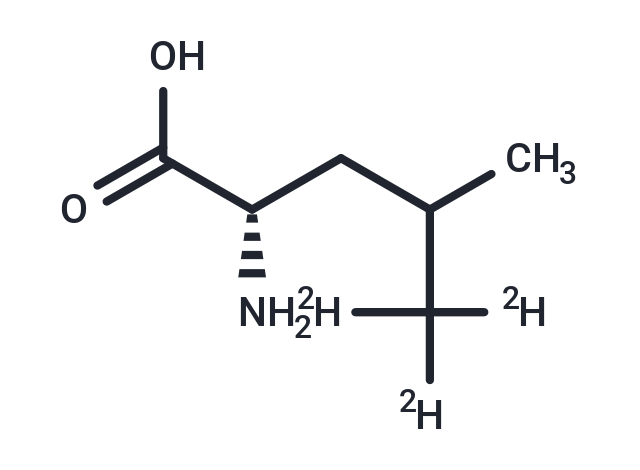Shopping Cart
- Remove All
 Your shopping cart is currently empty
Your shopping cart is currently empty

L-Leucine-d3 is a deuterated compound of L-Leucine. L-Leucine has a CAS number of 61-90-5. Leucine is one of nine essential amino acids in humans (provided by food), Leucine is important for protein synthesis and many metabolic functions. Leucine contributes to regulation of blood-sugar levels; growth and repair of muscle and bone tissue; growth hormone production; and wound healing. Leucine also prevents breakdown of muscle proteins after trauma or severe stress and may be beneficial for individuals with phenylketonuria. Leucine is available in many foods and deficiency is rare.

| Pack Size | Price | Availability | Quantity |
|---|---|---|---|
| 1 mg | Inquiry | 20 days | |
| 5 mg | Inquiry | 20 days |
| Description | L-Leucine-d3 is a deuterated compound of L-Leucine. L-Leucine has a CAS number of 61-90-5. Leucine is one of nine essential amino acids in humans (provided by food), Leucine is important for protein synthesis and many metabolic functions. Leucine contributes to regulation of blood-sugar levels; growth and repair of muscle and bone tissue; growth hormone production; and wound healing. Leucine also prevents breakdown of muscle proteins after trauma or severe stress and may be beneficial for individuals with phenylketonuria. Leucine is available in many foods and deficiency is rare. |
| Molecular Weight | 134.19 |
| Formula | C6H10D3NO2 |
| Cas No. | 87828-86-2 |
| Storage | Powder: -20°C for 3 years | In solvent: -80°C for 1 year | Shipping with blue ice. |

Copyright © 2015-2025 TargetMol Chemicals Inc. All Rights Reserved.